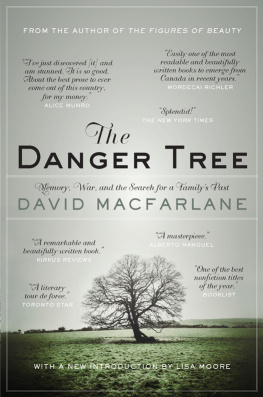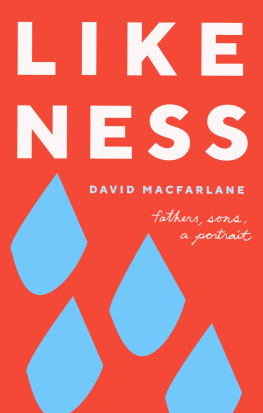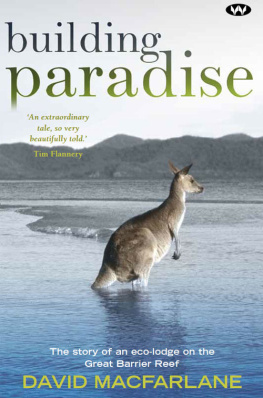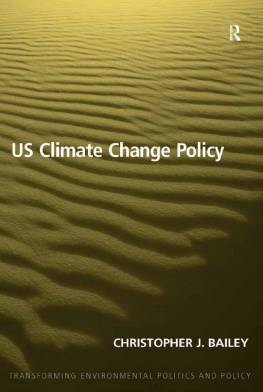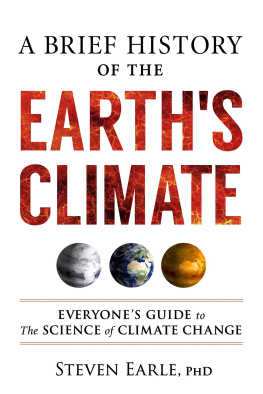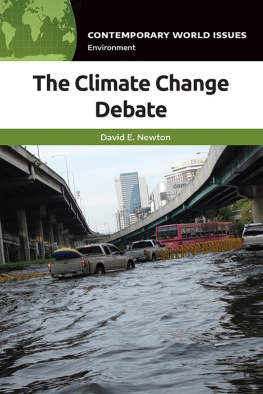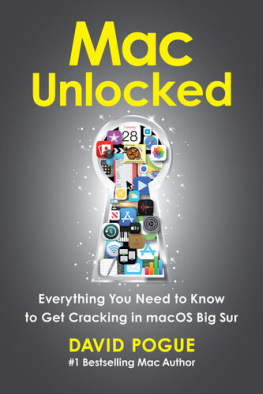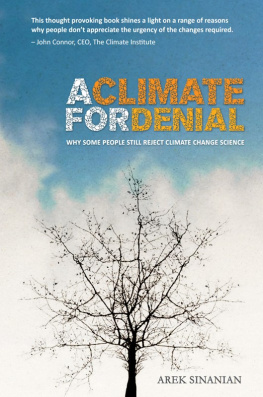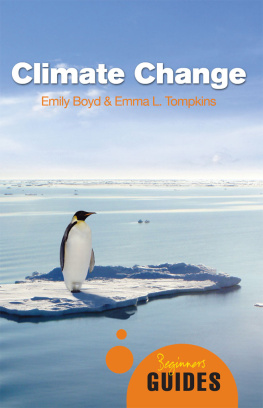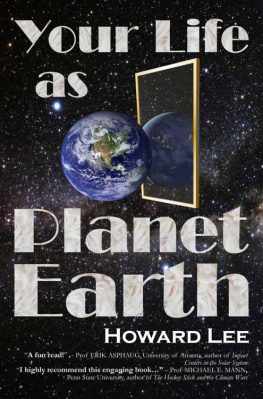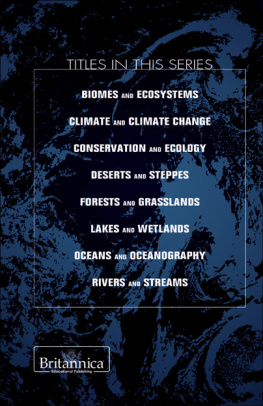David Macfarlane - Climate Sense: A Laymans Guide to Climate Change
Here you can read online David Macfarlane - Climate Sense: A Laymans Guide to Climate Change full text of the book (entire story) in english for free. Download pdf and epub, get meaning, cover and reviews about this ebook. year: 2019, genre: Politics. Description of the work, (preface) as well as reviews are available. Best literature library LitArk.com created for fans of good reading and offers a wide selection of genres:
Romance novel
Science fiction
Adventure
Detective
Science
History
Home and family
Prose
Art
Politics
Computer
Non-fiction
Religion
Business
Children
Humor
Choose a favorite category and find really read worthwhile books. Enjoy immersion in the world of imagination, feel the emotions of the characters or learn something new for yourself, make an fascinating discovery.

- Book:Climate Sense: A Laymans Guide to Climate Change
- Author:
- Genre:
- Year:2019
- Rating:4 / 5
- Favourites:Add to favourites
- Your mark:
- 80
- 1
- 2
- 3
- 4
- 5
Climate Sense: A Laymans Guide to Climate Change: summary, description and annotation
We offer to read an annotation, description, summary or preface (depends on what the author of the book "Climate Sense: A Laymans Guide to Climate Change" wrote himself). If you haven't found the necessary information about the book — write in the comments, we will try to find it.
Climate Sense: A Laymans Guide to Climate Change — read online for free the complete book (whole text) full work
Below is the text of the book, divided by pages. System saving the place of the last page read, allows you to conveniently read the book "Climate Sense: A Laymans Guide to Climate Change" online for free, without having to search again every time where you left off. Put a bookmark, and you can go to the page where you finished reading at any time.
Font size:
Interval:
Bookmark:
CLIMATE SENSE
D.M.MACFARLANE BSc. MSc.
Copyright 2020 D.M.Macfarlane
All rights reserved. No part of this publication may be reproduced, stored in a retrieval system or transmitted in any form or by any means, electronic, mechanical, photocopying, recording or otherwise, without the prior written permission of the publisher.
The information, views, opinions and visuals expressed in this publication are solely those of the author(s) and do not reflect those of the publisher. The publisher disclaims any liabilities or responsibilities whatsoever for any damages, libel or liabilities arising directly or indirectly from the contents of this publication.
Author: Macfarlane, D. M.
Title: CLIMATE SENSE: A Laymans Guide to Climate Change
ISBN: 9781794452770
Imprint: Independently published
ABOUT THE AUTHOR
David Macfarlane is a Sydney-based entrepreneur /building designer with a BSc in environmental architecture (UNSW, 1993) and a Masters in sustainable building design (Oxford Brookes, 2013). Amongst other projects, David designed, built, and operated for fourteen years a ten-cabin eco lodge on a remote national-park island on the Great Barrier Reef. His most recent project is northern Tasmanias Tamar Solarhome ( www.tamarsolarhome.com ), an all-electric, totally off-grid house.
Other books by David Macfarlane:
Adventures in Paradise : A memoir
Pandemic Red Pill : A Laymans Guide to The Great Awakening
PRAISE FOR CLIMATE SENSE
I loved your book. You seem to have successfully avoided the technical issues that befuddle non-scientists and have relied on logic and common sense (that also, alas, befuddle part of our elite, but are nonetheless more accessible to those with somewhat open minds). Dr Richard Lindzen (American atmospheric physicist and a lead author of the IPCC's Third Assessment Report on climate change).
Thanks for sending your book, it is very well done and covers some different territory than what I have seen before. Dr Judith Curry (American climatologist and former chair of the School of Earth and Atmospheric Sciences at the Georgia Institute of Technology).
Ideologies are simple ideas, disguised as science or philosophy, that purport to explain the complexity of the world and offer remedies that will perfect it. Ideologues are people who pretend they know how to make the world a better place before theyve taken care of their own chaos within. The warrior identity that their ideology gives them covers over that chaos. Ideologies are substitutes for true knowledge, and ideologues are always dangerous when they come to power, because a simple-minded I-know-it-all approach is no match for the complexity of existence. Furthermore, when their social contraptions fail to fly, ideologues blame not themselves but all who see through the simplifications.
Dr. Norman Doidge
(author of The Brain That Changes Itself )
Those who are governed by reason desire nothing
for themselves which they do not also desire
for the rest of humankind.
Baruch Spinoza
Socrates used to call the popular beliefs bogies,
things to frighten children with.
Marcus Aurelius; Meditations
For humanity and our environment
CONTENTS
PREFACE
1. AN ECHO CHAMBER
2. THE CONSENSUS
3. SOMETHING SHIFTY
4. POLITICS & IDEOLOGY
5. WHAT SCIENTISTS ARE SAYING
6. THE REAL WORLD
7. MORE HARM THAN GOOD
8. BELIEVE WHAT YOU WILL
9. CONCLUSION
ACKNOWLEDGEMENTS
REFERENCES
PREFACE
I make no claims of expertise in regards to climate science. Im simply attempting to understand and explain in laymans terms what many scientists are saying about climate change experienced, well-credentialed scientists that for a variety of reasons (which I also explore) are not being acknowledged by the authorities or mainstream media.
I have not included graphs and charts in this book because I discovered that scientists can (and, in fact, usually do) manipulate data and scales in order to create graphs that support their own particular bias; to the extent that they almost become meaningless. Nor have I specifically referenced observations Ive made from viewing YouTube presentations, mainly because I hope to encourage readers to watch and listen to at least some of the debates, lectures, and interviews with the scientists Ive listed and form their own opinion instead of taking my word for it. And most importantly, I hope readers will be motivated to get better informed and think deeply about this important issue rather than simply following what appears to be the general consensus. In other words, if you dont believe or trust what Ive written, go directly to the source and find out for yourselves.
When I showed first drafts of this book to friends, family, and acquaintances, the most common reaction from those most determined not to question their own deeply-held beliefs after, I suspect, reading a couple of chapters at most was nearly always well thats just your opinion . And thats when I realised what I was up against. Apparently, many people, no matter how intelligent and well-educated, either cant tell the difference between opinion and observation, or simply use that claim to dismiss information that for some reason they dont want to hear. Either way, theyre certainly not interested in challenging their hard-held beliefs.
If I told someone Id just seen an elephant in their backyard, and they replied well thats just your opinion , Id reply; no, its not, its my observation . Of course an elephant in anyones backyard would seem so unlikely that they may question my eyesight, my motives, and even my sanity. But if I asked them to have a quick look for themselves, and they refused, Id wonder at their motives and sanity, and their lack of curiosity. Why would they not bother to look? Or perhaps more significantly, why are they afraid to look? Are they afraid of what they might find? Perhaps its just not socially acceptable to have an elephant in your backyard?
They might insist that they care deeply about what is in their backyard, and have checked with all their neighbours, the local council, the TV and radio stations, and many prominent experts, who all assure them there are no elephants to be seen. So they fervently believe there are none in their backyard; because they trust and believe the general consensus and the authorities, who, as we all know, always tell the truth and are always right.
But still they wont look for themselves.
Its a relevant analogy because many months after reading part of my first draft, as far as Im aware, none of those who declared its just your opinion have watched the easily-accessible online lectures by any of the climate scientists Ive referenced. For some reason they dont want to look. And thats dangerous. Because uninformed or misinformed people, with fixed opinions and beliefs, who are too frightened or too lazy to learn something new, are far too easily deceived and led by those with ulterior motives.
I make a lot of effort in this book to separate observation from opinion. Although obviously Ive had to make judgements on what observations to include, and my conclusions are my opinions based on those observations.
However, when I write, for instance, that a senior NASA scientist says something in particular about climate change, that is my observation, not my opinion. In fact, it is the opinion of a highly qualified scientist worth listening to; supported by statistical evidence and many years of professional research.
Despite having read, watched, and believed hundreds of books, articles, documentaries, and presentations about global warming or as its now called, climate change over the last thirty years, it wasnt until I started researching and writing this book that I realised how little I actually knew about something so vitally important to my own career.
Next pageFont size:
Interval:
Bookmark:
Similar books «Climate Sense: A Laymans Guide to Climate Change»
Look at similar books to Climate Sense: A Laymans Guide to Climate Change. We have selected literature similar in name and meaning in the hope of providing readers with more options to find new, interesting, not yet read works.
Discussion, reviews of the book Climate Sense: A Laymans Guide to Climate Change and just readers' own opinions. Leave your comments, write what you think about the work, its meaning or the main characters. Specify what exactly you liked and what you didn't like, and why you think so.

